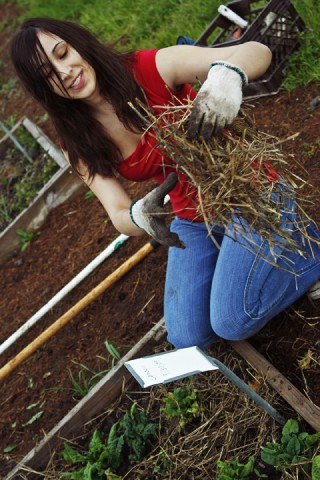
Matt Hellman | Lariat File Photo
By Jordan Hearne
Reporter
In a world filled with overpriced supermarkets that resemble shopping malls and processed snacks made with unpronounceable ingredients, a stand that sells fresh produce and organic animal products is a change from the common store shelves.
World Hunger Relief Inc. is a farm that shares food with the Waco community and works to educate residents about the benefits and economic stability of buying from local growers.
Amber Jekot, community outreach intern, works with coalition groups to form a network of shared resources.
She said she hopes the organization will show others the role farming plays in the global economy and how it influences the lives of people who depend completely on agriculture.
“We want to teach what it’s like to live the life of the poor, the importance of fair trade, where food really comes from and instill the responsibility that working in the field teaches,” Jekot said.
Volunteers and interns cultivate various fruits and vegetables in the fields while the farm’s goats and chickens provide milk, eggs and meat.
World Hunger Relief Inc. interns have witnessed the same methods the farm uses during mission trips to places like Haiti and El Salvador.
“All practices used here are the same as what is used in a Third World country,” Jekot said.
The main goal of the organization is to teach others how to use international and local food systems effectively and adopt a form of sustainable agriculture that sells goods directly to community buyers, food systems intern Annali Smucker said.
The organization strives to create a model of successful and sustainable farming that people can copy while sharing rewards with the community.
Part of that sharing stems from World Hunger Relief, Inc.’s involvement with a Community Supported Agriculture group (CSA).
Consumer members of CSA purchase a share and in return receive locally cultivated eggs, milk and produce each week.
According to the Local Harvest website, benefits from being involved in a CSA are shared between the consumers, who get a chance to learn where their food comes from and how it is prepared, and the farmers, who receive a steady cash flow to put back into their farm’s production.
World Hunger Relief, Inc. is one of the providing farms for the CSA serving the Waco area.
Consumers can also buy from the farm stand on Saturdays or shop in the village store during the week for fair trade products that give proceeds directly to the vendors.
Students looking to get involved with World Hunger Relief, Inc. have many different opportunities.
Smucker said volunteers are always needed to run the farm stand and the village store, and consistency when scheduling weekly volunteer days is key when signing up to work.
Another option for college students is a chance to live an alternative spring break at the Nicaragua House on the farm.
For a week, spring breakers learn what daily life is like in a Third World country by living with minimal modern luxuries and growing and preparing their own food.
“It’s rewarding to make an entire meal that they’ve worked all afternoon on,” Jekot said of the overall experience.
Many of the interns and volunteers live directly on the farm and spend all of their time working the field and learning new techniques.
Even with the temperature reaching triple digits, Smucker energetically kneaded dough in the farm’s humid kitchen to form a Tanzanian bread known as Chapati.
As she worked, she stressed the importance of remembering that their hard work is all for the good of the community.
“We’re not trying to just be an island and eat only food we produce,” Smucker said. “Communities survive by giving and sharing.”





